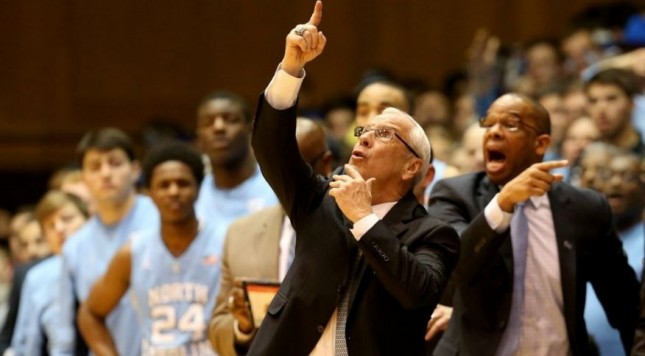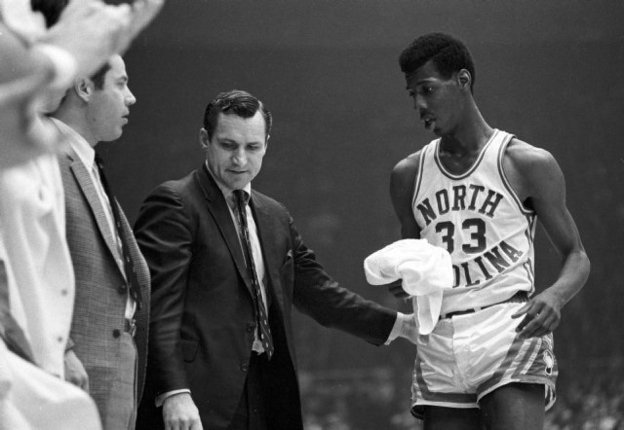Roy Williams’s resplendent Hall of Fame career runs through some of the central veins of college basketball history.
The sometimes-painful irony of that fact is that it’s all too close to the path carved out by his most famous predecessor and mentor, the late Dean Smith.
Williams and North Carolina won another regular season ACC championship Saturday night, as the Tar Heels defeated Duke in Cameron Indoor Stadium to claim an outright title. (The locals in ACC country refer to their “championship” as the ACC Tournament, but for many of us, 18 games represent a championship… just to present both sides of that story.) It should be the kind of moment that enables a coach to taste some sweet satisfaction.
The way some observers saw it, North Carolina won in spite of its coach, not because of him.
Roy Williams is relentlessly plagued by the same critique: “He just has to roll the ball onto the floor with the recruits he gets. IT’S NORTH CAROLINA! What an overrated coach.”
This is where the depth of Roy’s connection with Dean Smith truly comes into play. If people didn’t have such short memories, they might be able to appreciate Roy Williams’s career for what it is: a great one.
Dean Smith was born in Kansas and became an icon in North Carolina.
Roy Williams was born in North Carolina and became an icon in Kansas. The only reason he left Kansas to coach in Chapel Hill? Papa called. The very same Dean Smith asked him to take over the UNC program when Matt Doherty burned it to the ground.
Dean Smith’s most trusted assistant, Bill Guthridge, made two Final Fours, but Coach Gut was an old man not cut out for a long-term tenure as a head coach. Of Dean’s talented assistants in the early 1980s, Roy Williams went to the head of the class. His impact at Kansas was immediate. In his third season, he led Kansas to the national championship game. In his fifth season, he returned to the Final Four.
Then, from 1994 through 2001 — and more precisely, from 1995 through 1998 — Williams suffered the most wrenching losses of his career.
Kansas played the 1995 Midwest Regional in Kemper Arena, a virtual home game. The Jayhawks lost to Virginia.
KU’s most talented team ever, the 1997 juggernaut, somehow lost to Arizona’s young backcourt in 1997 in Birmingham.
The loaded 1998 team didn’t even make the Sweet 16, getting bumped off by Rhode Island in the round of 32.
The eight-season Final Four drought occurred even as Williams won stacks of conference championships in Lawrence: nine in his 15 seasons spent inside Phog Allen Fieldhouse. Larry Brown — another Dean Smith disciple — brought a national title to Kansas, but his nomadic ways didn’t allow him to make a nest at KU. Williams became that coach, and thus began the program’s most sustained period of prosperity in the NCAA tournament era, which began in 1939.
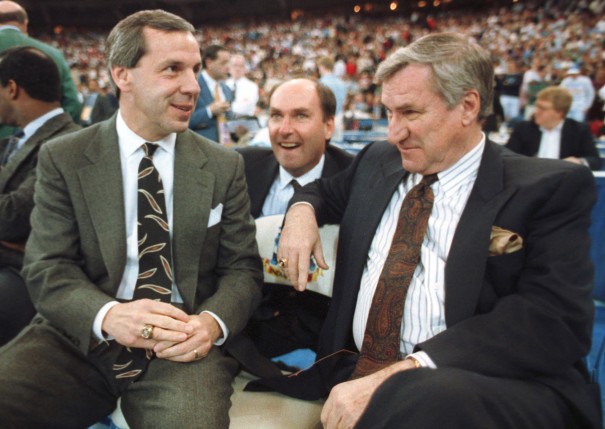
Roy Williams and Dean Smith at the 1991 Final Four in Indianapolis (with Jim Delany being way too happy about the moment in the background).
Kansas collected conference titles in clusters in earlier stages of the NCAA tournament era. The Jayhawks won four straight titles from 1940 through 1943, and then four more from 1952 through 1957. The ’57 team had a fellow named Wilt Chamberlain and finished as the NCAA runner-up. The ’52 team had a player named Dean Smith. Kansas later won back-to-back league titles in 1966 and ’67, followed by 1974 and ’75.
Yet, in terms of dominating a league on a relentlessly regular basis for more than five or six years at a time, it wasn’t until Williams came along that the Jayhawks truly planted their feet. In the late 1940s, early 1960s, late 1970s, and early 1980s, Kansas wasn’t a top-tier force. The program could fade from view at times. Roy Williams’s true significance in the larger history of the University of Kansas is that he enabled KU to become an even more entrenched power in college basketball.
Williams won seven conference titles in the 1990s, which — for most programs — represents an untouchable standard. Improbably, Bill Self has improved upon that standard as Roy’s successor in Lawrence. Yet, Roy created the culture and overall situation in which Self could succeed at a higher level. In terms of year-in, year-out consistency, Williams rates in the top tier of college basketball coaches. With this seventh regular season conference championship at North Carolina, freshly entered into the record books, Roy has won 16 such championships — nine at KU, seven at UNC.
Not many men have been able to win that often. Heck, not that many men are good enough to stick around long enough at one program of considerable stature, let alone two.
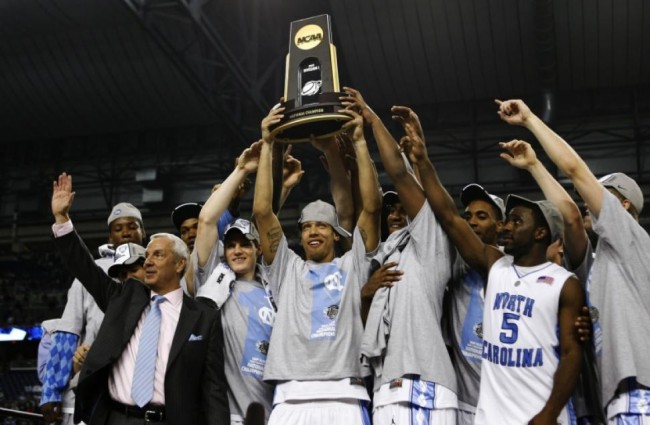
North Carolina’s last Final Four was seven years ago. When UNC doesn’t make the Final Four with regularity, it’s a problem… but March struggles are a fact of life in college basketball. Such is the reality of a one-and-done tournament. Only John Wooden escaped the sting of repeated March losses, and even then, he benefited from regionally-confined NCAA tournaments in the 1960s and 1970s. UCLA did not have to play teams outside the Western United States until the Final Four. This is a tough business, even for the best coaches and schools. It remains hard for people — including some bloggers and commentators — to understand that.
There really shouldn’t be any debate about Roy Williams’s quality as a head coach, but there is. The fact that North Carolina hasn’t reached a Final Four since 2009 certainly plays into this, which means it’s time to unfurl a reminder about Dean Smith’s career in Chapel Hill, something #CollegeBasketballTwitter would have pounced on had it existed in 1990.
In 1983 and 1984, UNC teams crammed with talent — Michael Jordan and Sam Perkins most of all — failed to make the Final Four. As the 1980s continued, North Carolina continued to regularly accumulate top-2 seeds in the NCAA tournament (1986 was the only exception — the Tar Heels slid all the way down to a 3 seed that year). The program always made the Sweet 16. Verily, UNC and Smith put together 13 straight Sweet 16s, one of the most impressive streaks in college basketball history, one that will be hard to break. Yet, even while that streak developed, North Carolina simply couldn’t return to the Final Four.
In 1987, Jim Boeheim’s world-class Syracuse team stood in the way. In 1988, Lute Olson’s first great Arizona squad was simply too good in the Elite Eight. Those losses are ones a coach can live with. However, losing to a slower Indiana team in the 1984 Sweet 16, and then to Rollie Massimino’s eighth-seeded Villanova group in the 1985 Elite 8, represented the kinds of losses Roy Williams suffered in the 1990s at Kansas during his own eight-year Final Four drought.
The reality is simple: Roy Williams has endured so many unexpected March losses that his teams have, undeniably, left money on the table at tournament time. This has created an enduring perception Williams has had to fight throughout his career. In a sport where regular season conference championships just aren’t given their due, and March overwhelms January and February, this kind of perception can linger in the public imagination.
The problem with that perception is that even the greats of previous generations — the greats who emerged in a world before social media — suffered similar fates. The Final Four droughts Roy Williams encountered at Kansas and now at Carolina also marked Dean Smith’s career. It wasn’t until 1991 that UNC returned to the Big Show for the first time since 1982. Had Twitter existed in 1990, the criticisms visited upon Roy today would have been thrown at Dean Smith in large quantities.
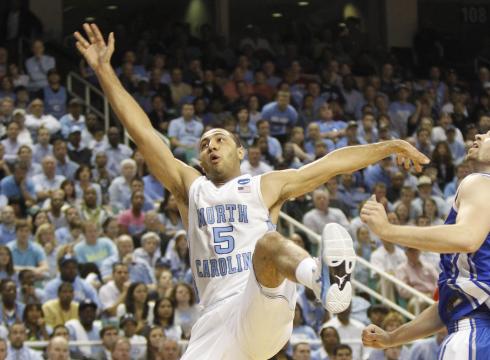
Had this injury to Kendall Marshall not occurred in the 2012 NCAA Tournament, North Carolina probably wouldn’t be sitting on a seven-year Final Four drought. Life. Sports.
North Carolina is a No. 1 seed in the ACC Tournament yet again. Each previous time the Tar Heels have been a top seed in the ACC postseason under Roy Williams, they’ve reached the Elite Eight or better. They probably would have made the Final Four in 2012, but a Kendall Marshall injury in the round of 32 scuttled those plans. To be quite honest, Williams doesn’t suffer bad NCAA tournament losses the way he used to at Kansas. However, a Final Four drought of anything more than four or five years at a place such as North Carolina will elicit all the familiar criticisms about failing to win at a blueblood program.
How soon people forget that it happens to just about everyone in college basketball.
John Woodens and Coach Ks are exceptional people, not the norms. Absorb that fact as you also absorb yet another regular season conference championship for Roy Williams, a follower of Dean Smith in all too many ways.

